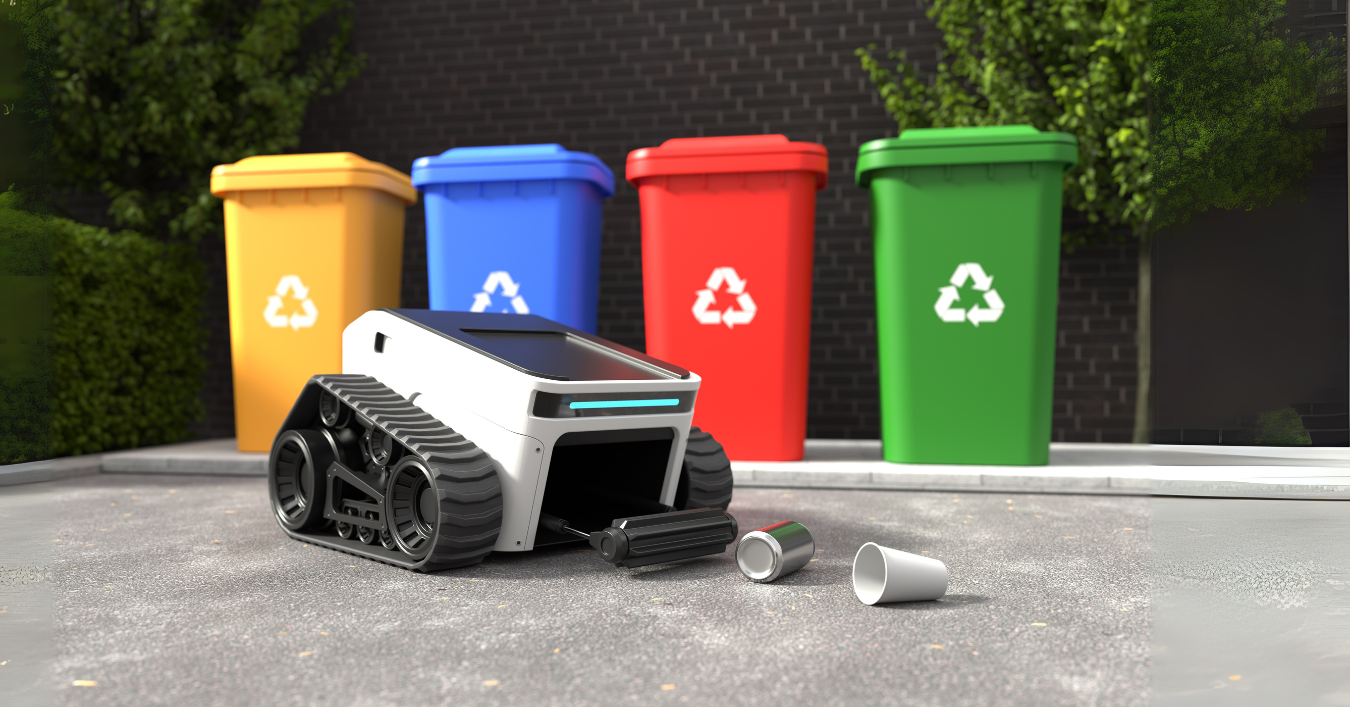
Level 3 Certificate in Advanced Solid Waste Management and Recycling Technologies
- Gain an in-depth understanding of advanced waste management strategies and technologies.
- Learn about the latest developments in recycling processes, waste-to-energy technologies, and waste minimization strategies.
- Understand how to manage different types of waste, including industrial, hazardous, and e-waste.
- Prepare for a career in waste management, sustainable development, or environmental consultancy with a focus on cutting-edge technologies.
- Understand the principles and technologies of advanced solid waste management.
- Be familiar with the latest recycling technologies and innovations.
- Learn about sustainable waste management practices, including waste reduction, resource recovery, and the circular economy.
- Gain the skills to manage hazardous waste, e-waste, and other complex waste types.
- Understand the role of waste-to-energy technologies and their impact on sustainable waste management.
- Learn how to assess the environmental and economic benefits of waste management and recycling strategies.
- Introduction to Advanced Solid Waste Management
- Overview of solid waste management principles, challenges, and opportunities.
- Study of the waste management hierarchy and sustainable waste practices.
- Recycling Technologies and Innovations
- Detailed exploration of advanced recycling techniques, including mechanical recycling, chemical recycling, and composting.
- Overview of innovations in material recovery and the role of technology in improving recycling efficiency.
- Waste Minimization and Resource Recovery
- Techniques for reducing waste generation, including source reduction and reusing materials.
- Study of resource recovery processes, such as sorting, cleaning, and reprocessing materials for reuse.
- Hazardous and E-Waste Management
- Identification, classification, and safe management of hazardous waste and electronic waste (e-waste).
- Techniques for recycling and disposal of hazardous and electronic materials in compliance with environmental regulations.
- Waste-to-Energy Technologies
- Introduction to waste-to-energy (WTE) technologies, such as incineration, pyrolysis, and anaerobic digestion.
- Environmental benefits and challenges associated with WTE processes.
- Circular Economy and Sustainable Waste Practices
- Exploration of the circular economy concept and its impact on waste management.
- Strategies for promoting sustainable consumption and production, including product design and extended producer responsibility.
- Environmental and Economic Benefits of Advanced Waste Management
- Assessment of the environmental and economic impacts of advanced waste management practices.
- Cost-benefit analysis of recycling and waste-to-energy projects.
- Regulations and Policies in Waste Management
- Overview of national and international regulations governing waste management and recycling.
- Study of waste management policies and their role in promoting sustainable practices.
- Progress to further studies in environmental engineering, waste management, or sustainability.
- Pursue roles such as waste management supervisor, recycling coordinator, sustainability officer, or environmental consultant.
- Work in industries like waste management, recycling, energy, government agencies, and non-governmental organizations focused on waste reduction and sustainability.
- Cutting-Edge Knowledge: This course provides a deep dive into advanced waste management technologies, keeping you ahead in an evolving field.
- Practical Application: Learn through case studies, real-world examples, and practical knowledge of the latest recycling and waste management techniques.
- Expert Instructors: Benefit from instructors who are experienced professionals in the waste management and environmental sectors, offering you valuable insights.
- Globally Recognized Certification: The Level 3 Certificate is well-respected in the industry, enhancing your credibility and career opportunities in waste management and recycling.
Study Units
- Introduction to Advanced Solid Waste Management
- Overview of solid waste management principles, challenges, and opportunities.
- Study of the waste management hierarchy and sustainable waste practices.
- Recycling Technologies and Innovations
- Detailed exploration of advanced recycling techniques, including mechanical recycling, chemical recycling, and composting.
- Overview of innovations in material recovery and the role of technology in improving recycling efficiency.
- Waste Minimization and Resource Recovery
- Techniques for reducing waste generation, including source reduction and reusing materials.
- Study of resource recovery processes, such as sorting, cleaning, and reprocessing materials for reuse.
- Hazardous and E-Waste Management
- Identification, classification, and safe management of hazardous waste and electronic waste (e-waste).
- Techniques for recycling and disposal of hazardous and electronic materials in compliance with environmental regulations.
- Waste-to-Energy Technologies
- Introduction to waste-to-energy (WTE) technologies, such as incineration, pyrolysis, and anaerobic digestion.
- Environmental benefits and challenges associated with WTE processes.
- Circular Economy and Sustainable Waste Practices
- Exploration of the circular economy concept and its impact on waste management.
- Strategies for promoting sustainable consumption and production, including product design and extended producer responsibility.
- Environmental and Economic Benefits of Advanced Waste Management
- Assessment of the environmental and economic impacts of advanced waste management practices.
- Cost-benefit analysis of recycling and waste-to-energy projects.
- Regulations and Policies in Waste Management
- Overview of national and international regulations governing waste management and recycling.
- Study of waste management policies and their role in promoting sustainable practices.
Upon completing this certificate, learners will:
- Understand the principles and technologies of advanced solid waste management.
- Be familiar with the latest recycling technologies and innovations.
- Learn about sustainable waste management practices, including waste reduction, resource recovery, and the circular economy.
- Gain the skills to manage hazardous waste, e-waste, and other complex waste types.
- Understand the role of waste-to-energy technologies and their impact on sustainable waste management.
- Learn how to assess the environmental and economic benefits of waste management and recycling strategies
This advanced certificate is tailored for individuals who aim to develop specialized skills and knowledge in modern waste management and recycling technologies. It is particularly suitable for:
-
Environmental and Waste Management Professionals
Individuals currently working in the waste management sector seeking to upgrade their expertise with cutting-edge practices and technologies. -
Recycling Plant Operators and Technicians
Professionals responsible for overseeing and operating recycling systems who want to stay updated on technological innovations and best practices. -
Sustainability and Environmental Officers
Those involved in developing and implementing environmental strategies within organizations, especially related to resource recovery and circular economy principles. -
Municipal and Government Employees
Personnel involved in public waste services, policy implementation, or city-level waste management programs looking to improve operational efficiency and compliance. -
Health, Safety, and Environment (HSE) Professionals
Practitioners aiming to broaden their scope by gaining knowledge of hazardous waste, e-waste handling, and regulatory frameworks in the waste sector. -
Industrial Facility Managers and Engineers
Professionals in manufacturing or industrial sectors who manage industrial waste streams and need to implement environmentally sound disposal and recycling methods. -
NGO and Development Sector Practitioners
Individuals working with communities on environmental awareness, recycling programs, or waste reduction initiatives in urban and rural contexts. -
Graduates and Aspiring Environmental Experts
Those pursuing a career in environmental science, sustainable development, or waste management who want a strong foundation in both the technical and policy aspects of solid waste management.
Our assessment process is designed to ensure every learner achieves the required level of knowledge, skills, and understanding outlined in each course unit.
Purpose of Assessment
Assessment helps measure how well a learner has met the learning outcomes. It ensures consistency, quality, and fairness across all learners.
What Learners Need to Do
Learners must provide clear evidence that shows they have met all the learning outcomes and assessment criteria for each unit. This evidence can take different forms depending on the course and type of learning.
Types of Acceptable Evidence
Assignments, reports, or projects
Worksheets or written tasks
Portfolios of practical work
Answers to oral or written questions
Test or exam papers
Understanding the Structure
Learning outcomes explain what learners should know, understand, or be able to do.
Assessment criteria set the standard learners must meet to achieve each learning outcome.
Assessment Guidelines
All assessment must be authentic, current, and relevant to the unit.
Evidence must match each assessment criterion clearly.
Plagiarism or copied work is not accepted.
All learners must complete assessments within the given timelines.
Where applicable, assessments may be reviewed or verified by internal or external quality assurers.
Full learning outcomes and assessment criteria for each qualification are available from page 8 of the course handbook.
Top Courses
No results found.
Related Courses
Let's Get in touch
Deleting Course Review
Course Access
This course is password protected. To access it please enter your password below:



